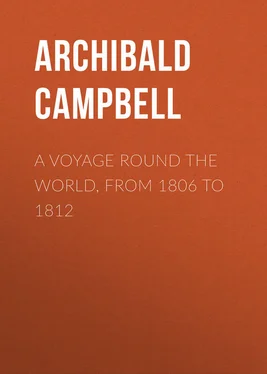Archibald Campbell - A Voyage Round the World, from 1806 to 1812
Здесь есть возможность читать онлайн «Archibald Campbell - A Voyage Round the World, from 1806 to 1812» — ознакомительный отрывок электронной книги совершенно бесплатно, а после прочтения отрывка купить полную версию. В некоторых случаях можно слушать аудио, скачать через торрент в формате fb2 и присутствует краткое содержание. Жанр: foreign_antique, foreign_prose, на английском языке. Описание произведения, (предисловие) а так же отзывы посетителей доступны на портале библиотеки ЛибКат.
- Название:A Voyage Round the World, from 1806 to 1812
- Автор:
- Жанр:
- Год:неизвестен
- ISBN:нет данных
- Рейтинг книги:4 / 5. Голосов: 1
-
Избранное:Добавить в избранное
- Отзывы:
-
Ваша оценка:
- 80
- 1
- 2
- 3
- 4
- 5
A Voyage Round the World, from 1806 to 1812: краткое содержание, описание и аннотация
Предлагаем к чтению аннотацию, описание, краткое содержание или предисловие (зависит от того, что написал сам автор книги «A Voyage Round the World, from 1806 to 1812»). Если вы не нашли необходимую информацию о книге — напишите в комментариях, мы постараемся отыскать её.
A Voyage Round the World, from 1806 to 1812 — читать онлайн ознакомительный отрывок
Ниже представлен текст книги, разбитый по страницам. Система сохранения места последней прочитанной страницы, позволяет с удобством читать онлайн бесплатно книгу «A Voyage Round the World, from 1806 to 1812», без необходимости каждый раз заново искать на чём Вы остановились. Поставьте закладку, и сможете в любой момент перейти на страницу, на которой закончили чтение.
Интервал:
Закладка:
On the 18th we were busy in making a larger tent with the sails we had got. We set up two small spars at each end, and laid a studding sail boom across the tops of them; over this we spread a topsail, hung smaller sails at the ends, and placed planks round the bottom, to prevent them from being blown up by the wind. With the soft moss of the island for beds, and planks to sit upon, we now found ourselves pretty comfortable in every respect but one: All our attempts to kindle a fire proved unavailing, and we were obliged to eat our victuals raw. Observing a flight of large birds, resembling ravens, carrying something in their talons, we watched where they alighted, and going to the spot, found several parcels of pork and beef which they had picked up, the barrels being staved by the rocks. In this manner we procured about a dozen of pieces. We again went off to the wreck in the afternoon, to see what we could get on shore, as it had every appearance of a gale of wind, and managed to get three of our chests out of the vessel before dark; and amongst them mine. It contained only one shirt and my bible, which I had put into one of those squares, common in sailor’s chests, for holding case bottles, and in which it was firmly fixed, in consequence of having swelled with the water. I was at great pains in drying it in the sun, and succeeded so well that I could read any part of it. It was afterwards saved from a second wreck; and in my future hardships and sufferings, the perusal of it formed my greatest consolation. It is still in my possession, being the only article I brought with me when I returned to my native country.
We also secured this day, a barrel of fine biscuit; it was soaked with salt water, but was, nevertheless, a most acceptable addition to our store. In the night, between the 18th and 19th, it blew so hard from the south, that the ship went to pieces before morning. At day-break, we discovered on a small isle, separated from the land by a channel which was dry at low water, the fore part of the ship, which had driven high up on the beach. Had we been able to have moved it to a better situation, it would have made an excellent hut; but this was beyond our strength. It was broken up and gradually removed when we could afford time. Some more fragments of the wreck, consisting of knees and planks, came on shore this day. We also recovered a few packages of nankeens and chests of tea, which we spread on the moss to dry.
Our horizon to the south being interrupted by the reef, the captain and mate went out in the long-boat to determine the latitude by a meridian altitude of the sun. The result of the observations gave 54 deg. 52 min. north, as the latitude of the south side of the island. 11 11 This observation, made without the assistance of an ephemeris, or tables of declination, can only be considered as an approximation. It however proves that Sannack and Halibut island is the same, the latitude of that island, as ascertained by captain Cook, being 54 deg. 27 min. As the observation was made about the time of the equinox, the correction for declination might be estimated within a few minutes.
We made a number of trips to the wreck in the course of the ten following days, and saved a considerable part of the cargo, consisting of chests of tea, packages of nankeens, and bags of rice. The last time we went off to the wreck, before the arrival of the Indians, the wind was off shore, and began to blow so fresh that we were obliged to desist from our labours. After having secured a few more sails, some coils of cordage, and two bales of silks, having only two oars and a heavy boat to row, we reached the shore before dark, after a most fatiguing pull. By this time so much of the wreck was recovered that we determined to build a vessel large enough to carry us to the Sandwich Islands, where we were certain of meeting with an American ship. Our principal attention was now turned to that object, and we began our preparations by collecting into one place planks and other pieces of wood suitable for the purpose.
CHAPTER III
Arrival of a party of Natives, and of the Russian Commandant of Oonalaska, who determines to send to Kodiak for assistance – Long-boat prepared for the voyage – Some account of Sannack or Halibut Island.
Our necessary occupations, and the unpromising appearance of the country, had hitherto prevented us from leaving the neighbourhood of our hut; but we had seen nothing that led us to imagine that the island was inhabited. We were, however, visited on the 28th, by a party of natives, who had traced the fragments of wreck along shore.
About mid-day we saw them approach in three small skin canoes, with one Indian in each. One of them, who had a gold medal about his neck, came forward, and addressed us in the Russian language. The captain, who had made a former voyage to these settlements, and understood a few words of the language, contrived to make our situation known to him. He immediately despatched one of his companions to a village on the northern part of the island for assistance, and the other to Oonalaska to give information to the commandant of the Russian settlements on that island.
The chief himself remained, and most willingly gave us a share of his provisions, which consisted of a bladder of train oil, and a basket of berries, about the size of bilberries, preserved in oil. These, to people in any other situation, would scarcely have been deemed an acquisition. Even we, who had lived so long on raw muscles, found some difficulty in reconciling ourselves to train oil; but we thought the berries, which had been cured with seal oil, no small luxury. This friendly Indian, who had hooks and lines, went out in his canoe, and in a short time returned with a few small fish. He then kindled a fire in the following manner: he laid a piece of soft wood upon the ground, and took another within his teeth; between these he put an upright piece of a harder quality, which he twirled rapidly around with a thong of hide, as we would a drill; the friction soon kindled the soft wood, and by placing it in dried grass, and blowing it, it burst into a flame.
We lost no time in broiling the fish, and enjoyed the first comfortable meal we had since the shipwreck.
Next day about forty Indians, men and women, came and encamped beside us; they made huts for themselves, by setting up planks, leaning against each other at the top, and throwing earth upon them, over which they put a covering of grass.
They brought a supply of provisions, consisting of berries, oil, blubber, and dried salmon, and gave us a share of all they had with the utmost liberality.
By the assistance of the Indians, who towed our boat with their canoes, we made two more trips to the wreck, and were successful in saving a considerable quantity of the cargo, as well as several articles of greater use to us for our intended vessel; such as bolts of canvass, cordage, and other naval stores, being part of the rigging of the ship that was stranded in the harbor of St. Peter and St. Paul. In saving these articles, the grappling-irons proved of the greatest service; for though the wreck lay in about three fathoms, the water was so clear, when the wind was southerly, that we could distinctly see what lay at the bottom. A considerable part of the ship still held together.
In about a week after this, Mr. Bander, the Russian commandant of Oonalaska, arrived in a large skin canoe or baidare, with twenty or thirty Indians, who also hutted themselves beside us. The presence of so many visiters formed a singular contrast to the solitude in which we had hitherto lived. Our tent was now in the centre of a busy and populous village.
Some of our new visiters erected huts, whilst others contented themselves with sleeping under their baidare, which they placed bottom up, and raised by supports from the ground on the lee side.
Читать дальшеИнтервал:
Закладка:
Похожие книги на «A Voyage Round the World, from 1806 to 1812»
Представляем Вашему вниманию похожие книги на «A Voyage Round the World, from 1806 to 1812» списком для выбора. Мы отобрали схожую по названию и смыслу литературу в надежде предоставить читателям больше вариантов отыскать новые, интересные, ещё непрочитанные произведения.
Обсуждение, отзывы о книге «A Voyage Round the World, from 1806 to 1812» и просто собственные мнения читателей. Оставьте ваши комментарии, напишите, что Вы думаете о произведении, его смысле или главных героях. Укажите что конкретно понравилось, а что нет, и почему Вы так считаете.












